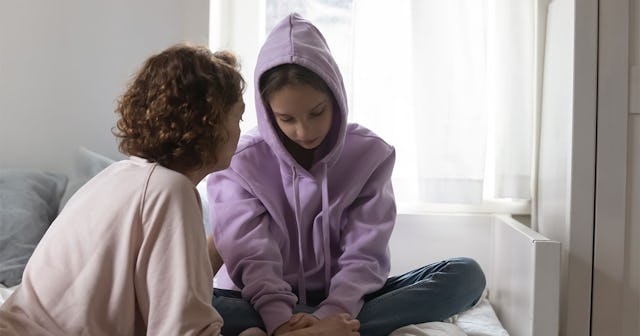Forgiving Your Kid When They’ve Done Something Really Wrong

My son got his driving license a few years ago. He was already ahead of the game because he worked with my father for years on his farm driving tractors, lawn mowers, and my father’s truck in his pasture.
The first time I got in the car with him, I was like any other parent (afraid for my life and very tense) but he was at ease and very confident. He passed his driving test on the first try (driving a standard car, something he really wanted and saved for himself).
He loved that car and would spend hours looking at it, washing and waxing it, and all his extra money went into decking it out. He was working all day on Saturday and Sunday, driving himself to and from work, driving his brothers and sisters to school, and going to the gym where he paid his own membership fees.
What I’m trying to say is that he was a responsible kid.
In our state, you aren’t allowed to have a minor in the car with you (unless they are a sibling) until you have had a clean driving record for nine months. I reminded my son about that a few times and he told me he wouldn’t do it.
“It’s not worth it,” I said. “Then you have to start over.”
While I’d never seen or heard of him driving friends around, I had suspicions. He told me I always thought the worst and to not worry about it.
Exactly two weeks before his ninth month with his license, he went out for a drive. It was during the pandemic and he said he just really needed to get out and he was going to take a ride to the store to gas up and get an energy drink.
I told him to be careful and settled into my show. Less than ten minutes later, I got a call from my son telling me he’d flipped his car over and he was fine, but the car was totaled and it looked really bad.
“Don’t freak out when you see it,” he said.
Instead of going to the store, my son took a joy ride with three friends (who were under eighteen) that he met down the road. He took a turn too fast and they all had to crawl out of his upside down car.
He didn’t call the police. Someone who saw the scene did.
I got there as soon as the cop did. Instead of fleeing the scene, his friends stayed for moral support and my son confessed to driving them around when he wasn’t supposed to.
He lost his license for three months, and couldn’t have another passenger in his car for another nine after he got it back.
Of course, I was glad that he and his friends were okay, but he’d been lying to me. Not only was he doing something illegal — he could have hurt or killed himself, his friends, or someone else who was on the road.
This is the reason they have that law: My son would have no reason to drive like an asshole if he wasn’t showing off for his friends.
A few days later, I was still fuming at him. I listened to a podcast about guilt. The therapist was explaining that guilt doesn’t serve us and those of us who continue to punish ourselves with guilt only do harm.
The truth was, I wanted my son to feel guilty. I thought he should feel guilty. Yet I realized something: I could punish him and give him a chance and the space to move on from this without holding it over his head. Or I could grind him about what he did all the time because my fear was if I didn’t remind him, he’d do it again.
That summer I learned a lot about giving second chances. My son broke my heart and I no longer trusted him. But I had to give him a chance to earn it back — something my brother-in-law, who is an elementary school principal, said is one of the most important things we can give our kids.
If we stay mad, hold a grudge, and refuse to trust them, they think they have nothing else to lose and they don’t want to follow the rules or be respectful. Why would they? We are pissed at them anyway.
I’m not saying our kids don’t need consequences; they do. I am saying they also deserve second chances, they deserve support, they deserve help. If we shut them out, we are only hurting them and ourselves and nothing is going to get better.
We need to trust ourselves as parents that if the bad behavior continues, we will give them more consequences when that time comes instead of holding their mistake over their head. That is only going to put distance between us and they will stop coming to us with anything because they will feel we will disapprove anyway.
I’m not saying this is easy — it was really hard for me not to suffocate my kid when he was able to drive again. The fact I believed in him was what he needed a lot more, though.
That was almost a year and a half ago, and it taught him a valuable lesson. Not only has my son not had any other incidents, he picked his brother up from school the other day and watched one of his friends (who was speeding in the school parking lot) get pulled over.
You know what he said? “It felt so good to drive by and be a good kid. Seeing that cop gave me flashbacks.”
Trusting our kids after they’ve screwed up does pay off. Even when you feel that your grace is the last thing they deserve.
This article was originally published on